
by Dharam CW2 | Apr 30, 2024 | Project Management
Stakeholder Relationships
In project management, having strong relationships with stakeholders is critical to success. As someone who has mentored thousands of PMP, PgMP, and PfMP professionals, I have seen firsthand how strategic stakeholder engagement can transform project outcomes.
Ways to approach Stakeholder Relationships
Below are some essential strategies for building and maintaining these crucial relationships:
1. Map the territory: Understand the stakeholder hierarchy and create detailed profiles for individual and group stakeholders.
2. Design relationship pathways: Use relationship maps to illuminate interactions, thereby ensuring timely and effective communication.
3. Consistency and integrity: Always interact with professionalism and authenticity, building trust through reliability and ethical behavior.
4. Meet and exceed expectations: Foster trust and bolster confidence by managing and surpassing stakeholder expectations, committing to your promises, and maintaining transparency.
5. Support to succeed: Focus on how you can support stakeholders in ways that benefit project goals, enhancing mutual success.
Let’s share our ideas on personalizing our approach to stakeholder management and take our projects to new heights of success.
🚀 Elevate Your Project Management Career:
– Register for my upcoming PgMP/PfMP Success Story Webinar: https://bit.ly/3TSx8fj
– Book an obligation-free consultation session on Project management Career, training, and certifications: http://talktodharam.com
– Discover training offers and certification discounts: https://bit.ly/3jWVepD
– Stay updated with our Q&A series and certification success stories by subscribing to the vCare Project Management YouTube channel at https://bit.ly/2YF0wJl
– Follow my podcasts and interviews with Project Management Experts on YouTube at https://bit.ly/2NDY8wd

by Dharam CW2 | Aug 25, 2023 | General
The modern workplace is undergoing a significant transformation. As a result, project professionals in both the public and private sectors worldwide have started to recognize the full range of benefits that successful project management can bring to their businesses and are prepared to make the required adjustments, particularly on cultural changes.
The success of each project is dependent on an effective project management strategy. Considering the next generation of project professionals, it is critical to have an efficient leader who can direct this process since it is methodically planning, organizing, and executing a pre-determined series of procedures to maximize resource utilization and achieve objectives. Project goals will likely be met with a manager monitoring adequate planning and checking off milestones.
To compete in the upcoming competitive market, a project manager must have the technical, digital, and other essential project management skills to comprehend future project challenges. On the other hand, a project leader with an effective skill set can tackle all the challenges in a project in the right way. So here are some of the challenges and skill sets to manage a project for the next generation of project managers.
Challenges of Project Management
According to data provided in the PMI’s Pulse of the Profession 2020, 11.4 percent of corporate investment is lost owing to poor project performance.
What variables might contribute to poor project performance? There are examples of a need for more precise planning, inconsistent procedures and techniques, incorrectly managing or accounting for all project stakeholders, budget overruns, and other causes.

Categories of Project Failure
However, if we take a step further, the causes of project failure fall into three major categories:
- People
- Processes
- Communication
Let’s look at the most common challenges for project managers and some tips on how to overcome them.

Challenges of Project Management
- Undefined Goals
Identifying project goals is one of the most common challenges in project management. The entire project and team might suffer when objectives need to be clearly defined. When top management cannot agree on or support undefined goals, the project has a limited likelihood of success. To define and convey clear goals, the project manager must ask the right questions and make the right decisions.
- Scope Creep
“Scope creep” occurs when incorrect project management permits the scope of a project to expand beyond its initial objectives. Clients and supervisors may request modifications to a project, requiring the project manager to examine each request and determine how and whether to accept it meanwhile also conveying the implications to all stakeholders regarding budget and timelines.
- Inadequate Skills for the Project
A project may necessitate the use of talents that the project’s contributors may need to have. Project management may assist a project manager in determining the required competencies, assessing existing personnel, and recommending training, outsourcing, or recruiting extra people.
- Lack of Accountability
When each team member accepts responsibility for their role in project success, the project manager’s leadership characteristics may come through. A lack of responsibility, on the other hand, might bring a project to an end. Learning to lead groups toward a shared objective is an essential part of project management.
- Improper Risk Management
Another key aspect of project management is learning to cope with and plan for risk. Because projects rarely go as planned, risk management is a desired project manager trait. To do their work effectively, project managers must solicit input, build trust, and understand which aspects of a project are most likely to deviate from the original plan.
- Ambiguous Contingency Plans
Project managers must understand which path to pursue in pre-defined “what-if” situations. The entire project may become entangled in unexpected problems if contingencies are not recognized. On the other hand, requesting that people identify possible problem areas can result in a smooth and successful project.
- Poor Communication
Poor communication can cause major project management issues. Project managers must offer direction at all project stages so that each team member understands what is expected from them. Therefore, effective communication with all people involved in the project is critical to its success.
- Resource Deprivation
Management must offer adequate resources for a project to function smoothly and successfully. The project management process aids project managers in establishing demands and securing approval up front, as well as how to assign and prioritize resources during a project.
- Lack of Stakeholder Engagement
A project can be ruined by an uninterested team member, customer, CEO, or vendor. A skilled project manager communicates openly and invites input at every stage to increase participant participation.
- Digital Transformation
Adapting to the correct tools, systems, and procedures becomes even more crucial as more firms board the digital transformation train. This difficulty stems from adapting to the appropriate project management system, enabling teams to construct, change, and improve existing procedures to expand and scale.
Overall, project management is in great demand and isn’t going away anytime soon. Indeed, project management is anticipated to expand by 33% by 2027. However, to keep up with the ever-changing business landscape, project managers must be updated on proper project management methods and trends.
Major Challenges for the Next Generation Project Managers

Major Challenges for the Next Generation Project Managers
- The first major challenge project managers must confront is technology globalization and the disruption of traditional corporate culture and model. This aspect includes eliminating the requirement to do business or manage projects from a single place. The adaptation of the “virtual team” has become a must, and a company’s agility might mean the difference between success and failure. What used to take months may now be accomplished instantly, emphasizing the necessity of a company’s ability to fast and naturally adapt to the fluctuating nature of today’s technology culture.
- The second major concern is worker involvement, a project manager’s capacity to grasp various roles and responsibilities and use agility to wear numerous “hats” depending on the project. Knowing generational drives, establishing moral leadership, and understanding how the team performs are all part of this.
- Finally, project managers will be impacted by innovation and risk. The problem is figuring out how to strike a balance between innovation and risk—as managing risk is an important project management skill—but without it, it’s hard to realize the entire project’s potential.
Future Trends of Project Management
Consider project management ten years ago: fewer tools, smaller teams, and more straightforward tasks. Since then, the project landscape has changed dramatically, with important developments such as:
- Blockchain
- Artificial intelligence
- Sustainability
- Remote teams

Future Trends of Project Management
Trend 1 – Blockchain
More businesses use blockchain technologies for management, such as when conducting dispute investigations. The capacity of blockchain to automatically update data makes it ideal for reconciling records and transactions. One of the most significant contributions of blockchain to project management will be smart contracts, which are effectively self-executing contracts powered by computer code.
Smart contracts reduce the number of key functions within the project manager’s scope, such as checking on project milestones and assigning new ones, which speeds up management processes. As a result, quicker workflow assures project completion on time and improves a company’s overall performance.
Trend 2 – Artificial Intelligence
Artificial intelligence is increasingly finding its way into project management systems, managing anything from predictive analysis to risk management. Because of its efficacy, as per the PwC report, by 2030, AI is expected to contribute:
- $42.7 B (7.7%) to Egypt’s economy
- $135.2 B (12.4%) to Saudi Arabia’s economy
- $96.3 B (13.6%) to the UAE economy
The primary capacity of AI is to provide data insights for decision-making, which increases the agility of any given project.
Trend 3 – Sustainability
Project sustainability is more critical than ever now. Governments and societies worldwide are demanding greener alternatives throughout the life cycle of a project.
Green initiatives are cost-cutting solutions for businesses. For example, energy is required for project completion, and shifting to renewable sources reduces costs. In addition, this frees up resources that may be directed toward other essential areas like innovation and research. Meanwhile, sustainable practices improve a company’s reputation and encourage consumer loyalty.
Trend 4 – Remote Teams
Remote teams have been the norm since the advent of communication technology. As a result, businesses gain from a more diverse and borderless talent pool easily available through contracts. In addition, they spend less on office space, travel, and other administrative expenses.
Data from Upwork’s Future Workforce Report 2021 revealed that more than half of the US population was working remotely to some level. Furthermore, 40.7 million Americans will likely be fully remote during the next five years.
Furthermore, in its 2022 State of Remote Work Report, Buffer discovered that 97% would promote remote work to others and continue to work remotely, at least for some time or for the rest of their lives. On the other hand, just 26% of businesses are prepared to offer a remote work environment.
As a result, it’s not unexpected that more workers anticipate that workplaces will become entirely virtual over the next several years. In general, remote working arrangements enable businesses to extend their resources while increasing operational efficiency. As such, they are crucial in developing lean, competitive firms.
Key Skills needed for Next-Generation Project Managers
Because of rising trends such as remote teams, digitalization, and automation, project management has changed dramatically in recent years. More companies rely significantly on technology to plan, execute, and monitor work.
As an example:
- Big data and artificial intelligence for better risk forecasting
- Remote progress tracking using digitization technologies
- Automation software for more efficient execution
These solutions have improved firms’ management capabilities and altered project management’s future.
According to Gartner research, 80% of management duties will be automated by 2030, and future managers will need more technical skills. They must be knowledgeable about cybersecurity, blockchains, machine learning, and robots, all of which are expected to play larger roles in management.
To stay up with trends in modern project management, a fundamental understanding of topics such as data science, conflict resolution, and entrepreneurship is required. For example, data science skills may assist a manager in incorporating AI into more elements of the project life cycle. Here’s a closer look at what these skills include and how they’ll stay up with future innovations in project management.

Key Skills Needed For Next Generation Project Managers
Skill 1 – Data Science
Big data insights are essential management tools in the future, especially for large projects with extensive life cycles. In terms of planning, insights from previous projects indicate inefficiencies that can guide the current project, such as the number of idle hours and their causes. In terms of execution, data analytics assess progress and spot deviations early, such as changes in material prices and exchange rates that exceed estimates.
Skill 2 – Conflict Resolution
Today’s projects are extremely complicated, with constantly changing deliverables. As a result, conflicts are never far away.
These conflicts, if left unaddressed, can undermine your team’s performance, resulting in delays and missed deliverables. Managers must thus understand the aspects of conflict resolution, such as:
- Behavioral and organizational aspects of a positive workplace
- Effective communication
- Effective contingency planning
Skill 3 – Entrepreneurship
Project managers are essentially CEOs. On the one hand, they are in charge of project deliverables, while on the other, they are negotiating with shareholders and setting targets based on estimates. As a result, being productive requires more than technical and administrative skills. Project managers must also have entrepreneurship skills, such as strategic thinking and market insight. This skill is beneficial for modifying deliverables, which is typical in agile projects like software development.
Skill 4 – Resource Management
Budgets and timeframes became tighter as projects got more significant and more complicated. Today’s project managers must balance budget constraints, deliver quality, and achieve deadlines with limited resources. They are entrusted with creating a lean organization.
For optimal efficacy, a delicate balance of resource allocation is required, as over-allocation to one activity inhibits the others. So, managers must understand resource management principles such as equilibrium shifts and flexibility.
Skill 5 – Digital Skill
Digital skills are essential for future project managers. According to the CBI’s report on developing a world-leading innovation economy, upskilling employees with digital skills is critical. However, the digital skills pipeline could be improved. They believe more should be done to foster more ambition in that field.

Digital Skills For Project Managers
Project managers need to have the following digital skills:
- Data analysis, analytics, and management
- Data security and protection
- Compliance with the rules and regulations
- Leadership and collaboration online
- Management of knowledge
- Decision-making based on data.
Considering the vital significance of the project manager’s role and how it changes, here is a list of additional skills for project leaders to follow in the present and future to enhance their careers and succeed.

Skills For Future Project Leaders
- Emotional Intelligence: The capacity to detect and interpret events and interactions (both verbal and nonverbal) in the context of the project plan.
- Adaptive Communication:The ability to explain one’s views to various individuals, groups, and cultures, whether orally or in writing, utilizing the most successful communication approaches for each group.
- People Skills: The ability to rapidly establish and maintain strong connections with team members and stakeholders.
- Management skills: The capacity to serve, encourage and concentrate a team, and create team member collaboration.
- Flexibility:The willingness and capacity to modify one’s project management style and course of action in response to business needs.
- Business Skills:Understanding the organization’s business, strategy, and industry. Understanding of a plan and ability to coordinate tactical work around that strategy.
- Analytical abilities:The capacity to think through circumstances and make judgments.
- Customer Focus:The ability to comprehend the end user’s or end customer’s demands and the drive to guarantee that projects meet those needs.
- Results-Orientation:The capacity to do tasks efficiently and successfully.
- Character:The project manager should have a pleasant demeanor and a solid moral and ethical foundation.
Final Thoughts
With a focus on the future generation, we’ve entered a project management world where we need to be aware of the key challenges we’ll encounter as project managers and the skills we’ll need to improve to succeed: technology globalization, worker engagement, and the battle between innovation and risk. There are, however, a few crucial insights to remember as you continue your journey through the strange and ever-changing world of project management.
- Be agile or be gone:Business constantly needs greater flexibility, strategy, and adaptability than ever before. No one strategy will work every time; knowing how to adjust to change with agility and rapidity is essential.
- Expect all teams to act differently:Teams will always be more diverse than those who make them up. However, you can lead more successfully if you genuinely grasp your team and each member’s unique imperatives. Because project teams determine project success, one of the most crucial skills of a competent project manager is the ability to construct an effective, high-performing team.
- Help team members understand the big picture:This will assist them in preparing for obstacles. When attempting to resolve an issue or manage change, keep the immediate consequences in mind to prevent losing sight of the forest for the trees.
Feel free to check out my discussion on this topic with Thomas Walenta in YouTube

by Dharam CW2 | Aug 11, 2023 | General
A project manager or leader is much more than someone who develops a strategy and controls all operations within a project. These experts, for example, must be skilled in communication and connection-building because the work requires them to do it frequently. The capacity to develop long-term, trusted relationships with stakeholders is a critical component of project managers’ and leaders’ success. Whether they like it or not, diverse stakeholders directly impact the business. As a result, companies with managers who can foster a deep connection with their stakeholders have a substantial competitive edge in today’s interconnected business environment.

Stakeholders
Why Stakeholders are Important to a Project
A stakeholder is an individual, group, or organization whose interests are affected by the success of a business venture or project. As the name suggests, stakeholders are interested in a project’s success. They might be internal or external to the entity funding the initiative. Stakeholder relationships may positively or negatively impact the project’s life cycle. Therefore you’ll need to identify your key stakeholders and develop a stakeholder management plan to fulfill the requirements.
Every project you manage has stakeholders, whether internal or external. One of the most common reasons for project failure is that the deliverables differ from what the customer requested or did not meet the customer’s demands. To guarantee project success, one should be familiar with the project’s main stakeholders, how they communicate their needs, and what acceptable results are.
Engaging stakeholders throughout the project, especially at the start, will assist, reduce and discover hazards and boost overall “buy-in.” When stakeholders are fully engaged, their impact is amplified. Stakeholders are vital to a project in the following ways.

Importance Of Stakeholders In Project
- Providing Expertise
Stakeholders are a source of information about current processes, historical data, and industry expertise. When gathering and documenting requirements, it is critical to include all essential stakeholders. Project managers and those in charge of deliverables may be experts on only a few projects. Key stakeholders can contribute to industry-specific needs or limitations that can be useful in identifying project constraints and risks.
- Reducing and Uncovering Risk
The more one engages and involves stakeholders in the project, the more they will decrease and identify risks. For example, during discussions, stakeholders may raise concerns regarding satisfying original specifications, project demands, and limits. Identifying risks and developing a plan to manage them before issues arise will significantly improve your initiatives’ success.
- Increasing Project Success
Stakeholders should be aware of the project scope, significant milestones, and when they will be asked to evaluate deliverables before final acceptance. Set expectations early in the project life cycle if the business must satisfy stakeholders’ demands due to competing needs or priorities. This move will assist in maintaining the relationship throughout the process.
- Granting Project Acceptance
The more frequently you interact and include stakeholders from the beginning, the more likely you will have a successful project outcome. By the end of the project, team members should be aware of delivery expectations and risks and how to reduce those risks. The final acceptance is their last stamp of approval at the project completion phase.
Stakeholder Relationships are key
Building relationships with stakeholders leads to improved trust. People collaborate more readily and successfully when there is trust. Investing time and effort in discovering and cultivating stakeholder connections may boost project confidence, reduce uncertainty, and accelerate issue resolution and decision-making. This concept recommends making a deliberate decision to devote time, attention, and effort to stakeholder relationships. In addition, personal qualities such as self-awareness, mindfulness, respect for others, and courage may be essential to developing trustworthy, open, and honest relationships.

Ways To Approach Stakeholder Relationships
How could we approach it?
- Determine the stakeholder hierarchy.
- Create profiles for individual and group stakeholders.
- Create relationship maps.
- Determine who should interact with whom and when.
- Always maintain a professional and genuine demeanor.
- Build trust and confidence through controlling and satisfying expectations, acting with integrity, honoring commitments, and being trustworthy.
- Consider how you can assist your stakeholders rather than just how they can assist your project.
Risks of overlooking this concept include:

Risks Of Overlooking Into Stakeholders Relationship Concept
- Increased project risk in terms of time, cost, and quality.
- Greater known and unknown project opposition.
- Project management is shattered.
- Reduced team motivation.
- Low cohesiveness within the project community.
- Personal and corporate reputational damage, as well as recrimination.
The benefits of applying this concept include the following:

Benefits Of Building Stakeholder Relationship
- Mutual trust and confidence have grown.
- Stress reduction and a more pleasant working atmosphere.
- Improved problem-solving and decision-making.
- Increased bid value and increased possibilities of keeping clients and employees.
- Opportunities for personal development, maturity, and career progress.
- Sufficiently prepared to deal with challenging circumstances.
- Legacy to carry on with future endeavors.
Ways to build good relationships with Project Stakeholders
Stakeholders must be effectively taken care of for any firm to succeed. These include the customers, suppliers, partners, investors, workers, and the general public interested in your company. When a stakeholder is neglected, the organization can feel the consequences. Building great connections with stakeholders requires work, time, and a well-thought-out action plan.
Building trusted relationships with key stakeholders and maintaining communication throughout your project is essential. Through active engagement and speedy resolution, engaged stakeholders motivate individuals and keep the project on track.
Project managers establish trust and interact with important stakeholders at the outset. However, as the project progresses and the team size rises, we need to catch up on the importance of maintaining those connections. If unengaged, it usually results in communication failures, a mismatch of expectations, delayed decision-making, and, in extreme cases, misaligned project goals with company strategic objectives.
Here are six suggestions for developing and maintaining effective stakeholder relationships.
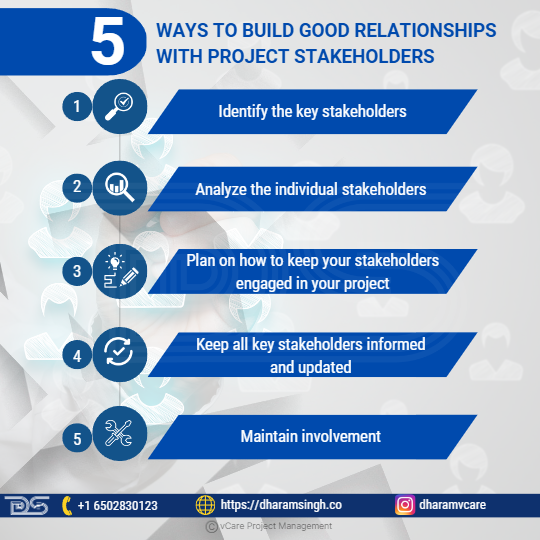
Ways To Build Good Relationships With Project Stakeholders
- Identify the key stakeholders.
In every project or program, the project manager oversees the initiative and identifies all stakeholders involved in planning, status reporting, or managing the dependencies. However, the focus here is on how you engage your important stakeholders. Who are the most important stakeholders? It is determined by project type, organizational structure, industry, and internal and external relationships.
Key stakeholders in project engagement are:
- Persons who have decision-making authority.
- Influence.
- A vested interest in the project’s result.
They might be part of your project’s organizational structure (such as a project sponsor or business sponsor) or an extended stakeholder (like external customers or funding partners).
Identifying these important stakeholders early in the project allows the PM and team to build trusted relationships and understand their expectations of project deliverables, their role, and their level of engagement on an ongoing basis.
- Analyze the individual stakeholders
Analyze the individual stakeholders identified at the previous stage to determine the amount of involvement and time required to create the connection. Historical data, team brainstorming sessions, focus groups, and interviews might provide the necessary knowledge for analysis. Next, each important stakeholder is examined to determine their attitude toward the initiative, level of support, influence, and acceptance of the change.
The project manager would decide on the amount of engagement based on their interest in the project and their ability to affect change. When there is more ambiguity about the program’s scope, objectives, and expected outcome, the PM’s role in managing expectations and relationships is more significant.
- Plan on how to keep your stakeholders engaged in your project
Consider organizational culture and attitudes toward the project while developing an engagement plan. For example, understand the stakeholder’s level of support or resistance to team talks.
Define how you will assess when a stakeholder becomes disengaged as part of your strategy; the metric may be anything like the number of mandatory meetings missed by the stakeholder in a month. When a significant stakeholder consistently skips a needed meeting or fails to make timely decisions, it is a source of contention. If not handled, this disengagement will begin to undermine the project.
- Keep all key stakeholders informed and updated
The project manager is responsible for keeping all key stakeholders informed and updated as frequently and as early as feasible during the project. Therefore, maintain a proactive approach in your discussions with them.
To build a standardized onboarding process, new stakeholders should become acquainted with a collection of standard artifacts (like the charter, communication plan, business case, and risk register). Also, take the chance to hear from current stakeholders. Feedback from stakeholders who no longer have a vested interest in your endeavor may help you adjust your path.
- Maintain involvement
It is critical to maintain your involvement, especially in long-term initiatives. At the end of a project, we’ve seen project teams wear out, with stakeholders eager to move on to the next big thing. The project manager must keep the engagement going. The connections and reputation you build via this involvement can help you succeed in future efforts in large businesses. Maintain contact with your key stakeholders long after the project has been completed and delivered.
Project Management Trends That Will Shape the Future
Project management is crucial in deciding how businesses and organizations will fare in the marketplace. Projects might include implementing a corporate plan, running marketing efforts, or organizing business events. Teams work to interact, manage, and communicate as effectively as possible to complete tasks and meet deadlines.
Organizations flexibly responded to the pandemic’s disruption by developing new methods of operation. However, they were thrust into the era of digitization and had to reconsider their methods of operation. These top 6 project management trends in the future demonstrate the ongoing need for technical innovation and digital transformation regarding the function of project management software in the future by building great stakeholder relationships.

Future Project Management Trends
- AI Automation and Implementation
The use and usage of artificial intelligence are the most obvious of the new current trends in project management. Knowing which initiatives are more successful enables teams to precisely determine which aspects are vital if the firm is to reduce costs and risks. As a result, organizations may increase transparency and productivity. The main factor driving the current increase in the adoption of such software is this characteristic of project management systems.
Let’s look at a few instances:
- A few businesses currently use automated and machine learning technologies to get alerts about potential issues the company could run into. For instance, suppliers might now get notifications about possible obstacles like bad weather and traffic.
- Building machine learning algorithms to support a project manager’s decision-making capabilities by evaluating data from several projects in the project portfolio is a promising study area.
- Globalized Project Management
As working circumstances got more flexible due to the forced work from home caused by the worldwide pandemic, businesses and teams became even more globalized. It has long since established roots. Mercer estimates that 70% of businesses want to use the hybrid work model.
Although the remote work and hybrid model trend allows for the employment of creative and inventive individuals worldwide, project management has to keep up with it. Collaboration, for example, is challenging when team members are unavailable due to competing schedules created by different time zones.
Software for project management provides a tool that could address this issue. The platform enables all brainstorming sessions and discussions to take place in a single setting, allowing businesses to access talent worldwide.
- Hybrid Project Management
The third new development in project management is the rising use of the hybrid approach, which refers to how project teams combine the Waterfall methodology, the systematic approach, with the Agile methodology, which is the quick-moving methodology. A hybrid approach aims to elevate teams to become aware of the specific project lifecycle while providing the ability to support them in changing the plan as necessary.
How do you know what will work for you, and how can you prepare for this trend?
PMs must learn about the most recent techniques, examine some of the fundamentals, and analyze how to use them correctly to obtain a greater understanding of the project situation and its aspects, such as the clients, the corporate objectives, and the purpose of the project, and the team’s attitude.
There is an increasing requirement to adapt your strategy and develop a project plan that enables you to lead projects unconventionally and comprehend different components of multiple techniques that cater to the demands of your team, perceived timeline, environment, end goals, etc.
- Stakeholder-Centered design
The fourth most recent trend in project management is an emphasis on delivering transparency for the benefit of the company’s stakeholders and developing products centered on the human perspective. Project managers may communicate with, collaborate with, and inform stakeholders. This design makes it easy for investors and customers to support any project launched as part of a company’s business plan.
- Soft Skills
Soft skills have become an essential component of project management. Project managers must interact with stakeholders, clients, and project teams. They will mitigate risks, resolve internal disagreements, and keep the project team engaged. Having a high level of emotional intelligence will also be useful in project management. Therefore, organizations should begin investing in tools and programs that assist employees in acquiring soft skills.
- Predictive Data and Simulation-Based Analyses
The most difficult and demotivating aspect of managing several projects is when unanticipated repercussions jeopardize their success. Project managers seek a solution to give them the knowledge to account for the unexpected. Project teams with predictive and data analytics skills may fully use KPIs and benchmarks and execute them proactively by developing data-backed best practices.
Companies cannot afford to bear the repercussions of project failure, given the competitive environments of most markets. Therefore, projects must be started successfully to stand out from the competition. The most recent advancements in project management software demonstrate that technology will play a role in this element of corporate operations in the future. Suppose you want projects to succeed and businesses to thrive. In that case, you should consider introducing project management solutions to simplify your, your teams, and your stakeholders’ lives.
Final Thoughts
Stakeholder involvement will become essential to optimize success as knowing stakeholders becomes increasingly critical for firms. For example, stakeholder engagement may assess reactions, track public impressions of a company’s operations, and assure collaboration and partnership with all stakeholders. In addition, an organization’s long-term performance may be determined by its connections with stakeholders, which provide commitment and buy-in to future initiatives and difficulties. As a result, the company becomes more aware and responsive to the demands of all its users and stakeholders.
Stakeholder management must place a greater emphasis on involvement to move projects from installation to execution. Stakeholder management must be less hierarchically centered while considering companies’ changing political nature. Projects should begin by identifying diverse stakeholders, engaging with them consistently, and coordinating continuously to increase project success.
As a project proceeds, Stakeholder management processes need to account for the dynamic nature of stakeholders’ commitment to a project and the interactions between various stakeholders. As a result, project teams will get the competitive advantage they want by focusing not just on their stakeholder position but also on the other major stakeholders in a project and how they interact. To achieve more effective stakeholder involvement, follow these three steps:
- Create a stakeholder map and keep it updated as the project progresses.
- Prioritize essential stakeholders and regularly evaluate assumptions about commitment levels and impact.
- Create essential stakeholders and increase their commitment to the change.
Feel free to check out my discussion on this topic with Justin Buckwalter in YouTube
For any questions related to your Project Management career, training, and certifications, you can book an obligation free 15 minutes session with me by visiting talktodharam.com
You can subscribe to the vCare Project Management YouTube Channel to catch future videos of our Q&A series and certification success stories: https://bit.ly/2YF0wJl
You can subscribe to and follow my podcasts and interviews with Project Management Experts on YouTube at https://bit.ly/2NDY8wd
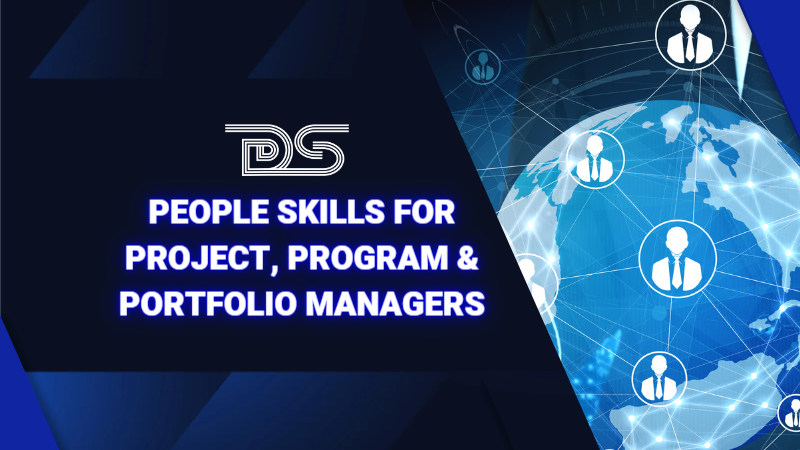
by DharamCW | Apr 21, 2023 | General
What makes a successful Project/Program/Portfolio Manager? Is it the number of years of experience? Technical know-how? Or the one who is good at managing people?
Creating objectives, critical path analysis, work breakdown structures, resource scheduling, and risk management are just a few of the technical areas of project management that project managers usually get training in. However, understanding pertinent people and management issues is important to a project’s success. In addition, a project manager must also continually deal with clients and other stakeholders. As a result, project managers’ people skills, also known as soft skills, are becoming increasingly important.
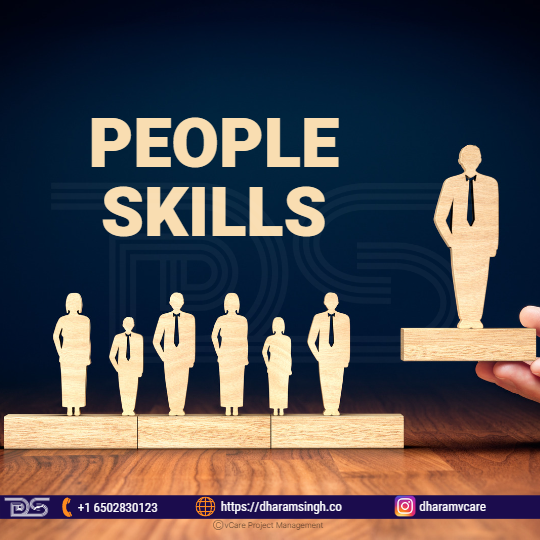
People Skills
People skills
People skills are linked with behavioral patterns or behavioral interactions that assist one in communicating effectively with people. Project leaders with strong people skills may favorably influence others, socialize effortlessly, and overcome public anxiety.
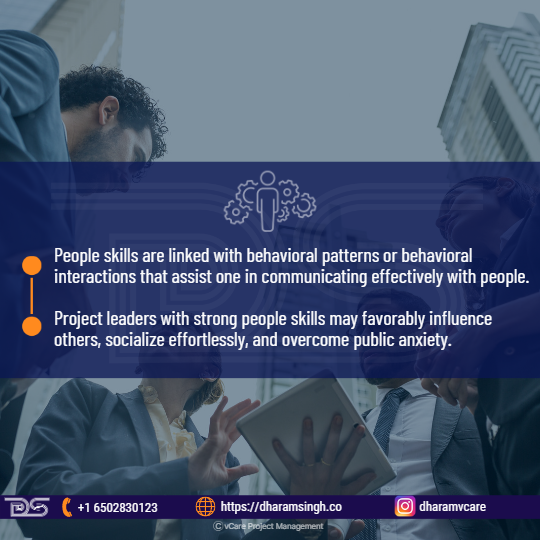
Project Leaders With Strong People Skills
They are transferrable social abilities that allow one to collaborate well with others. The three main types are personal, interaction, and interpersonal skills. These categories achieve the same overall objective: making the working connections with others mutually satisfying, pleasant, and productive.
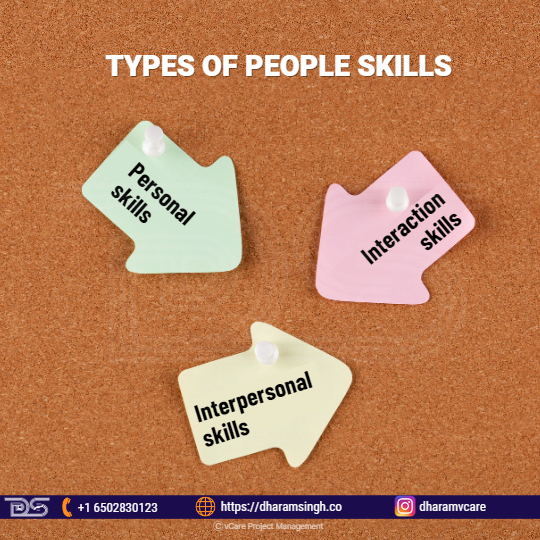
Types Of People Skills
Types of People Skills
- Personal skills: These include the capacity to communicate your skills and exhibit yourself to others successfully. It comprises characteristics such as self-assurance, honesty, and aggressiveness. Furthermore, one must be able to recognize their limitations and make sound judgments based on logic rather than emotion.
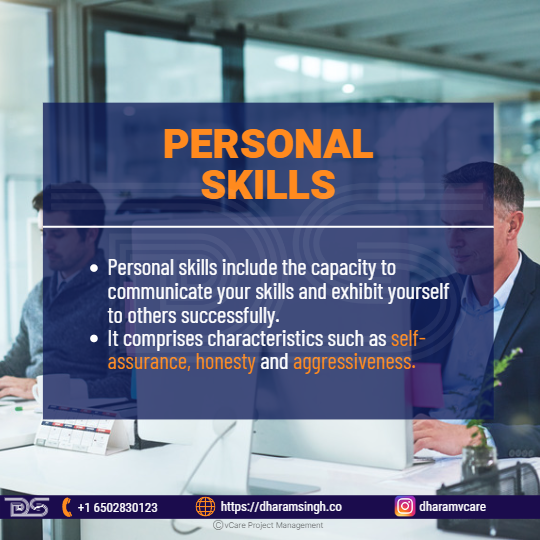
Personal Skills
- Interaction skills: It is essential for understanding the behavior and ideas of others while preserving limits and creating connections. A project manager, for example, should have social etiquettes that need empathy and listening skills to know that you have listened to them and given respect for their limits and requirements to connect with co-workers and clients productively.
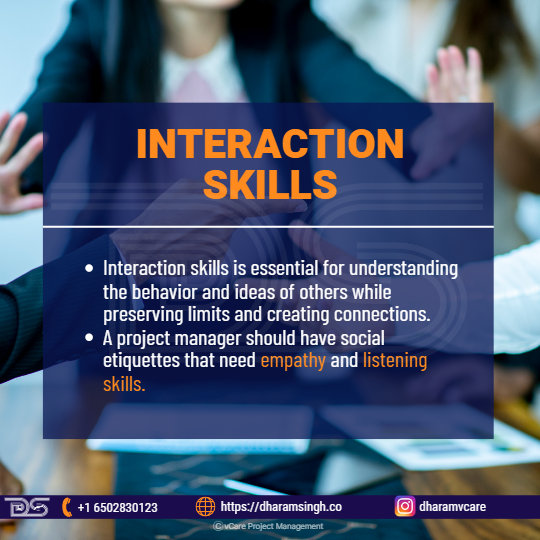
Interaction Skills
- Interpersonal skills: These are related to intercession skills, but they apply mainly to situations in which the persons involved have opposing interests or viewpoints.
Contrary to popular belief, people skills are not subjective concepts. On the contrary, these skills are critical, particularly in the project management role, which is largely concerned with people.
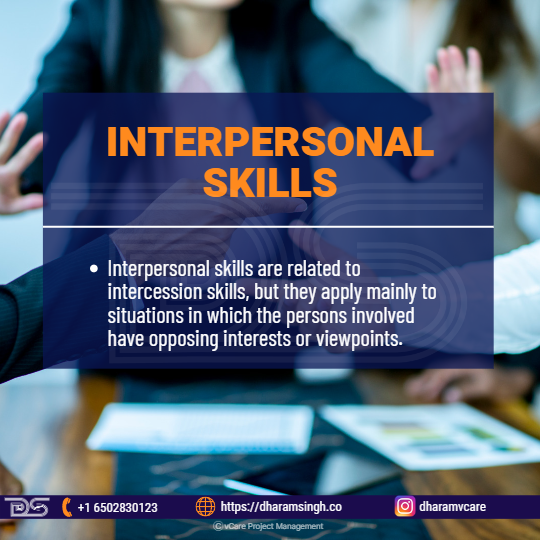
Interpersonal Skills
Project management is more than just completing the project; it is also about how you lead and assist your team. Leading others and leading them through the whole project lifecycle entails a certain amount of responsibility and necessitates certain abilities.
Furthermore, as work evolves, businesses embrace a varied workforce. As a result, people skills are essential for embracing tolerance and diversity. In short, good project management is based on human communication and connection.
Essential People Skills for Project/Program/Portfolio Managers
A successful project professional must possess a wide range of skills. Those that come to mind first are the technical skills required to create a project plan, schedule, budget, and all relevant paperwork. One must also have the conceptual skills to “see” the project as it develops.
However, such talents will only assure project success if the project manager can supplement their technical skills with a wide range of interpersonal skills or people skills. Here are some of the essential people skills for Project/Program/Portfolio Managers:
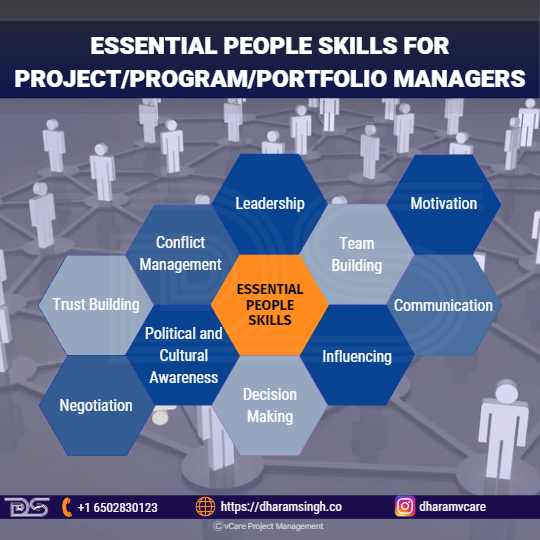
Essential People Skills for Project/Program/Portfolio Managers
- Leadership
One of the crucial skills a successful project manager has to have is leadership. This skill is essential because the project manager frequently has little control over the team members involved. This aspect calls for leadership on their part to handle the project. Although managing via leadership rather than authority might be more challenging, it is typically more effective since it is based on respect and trust.
At the start of a project, a leader must establish their vision and express it to the team. It makes supporting the project’s objectives easier for everyone on the team. Effective leadership will also keep the team members inspired and motivated to perform at their highest level.
- Team Building
Another vital skill for a competent project manager is team building. Because of the nature of projects, personnel from diverse departments are engaged. Most employees might have never worked together and may not even be familiar with one other’s departments. If the project manager can unite these individuals into a cohesive team with the same goal, the project may stay within its objectives.
Although some of the project’s individuals or sub-teams may execute their jobs individually, they must feel like they are part of the overall team. When choosing their part of the project, they must consider what is best for the project, not simply what is best for them and their departmental problem. A sense of belonging to a team that solves an issue for the entire company (rather than playing departmental favoritism) may go a long way.
Creating a team in which each member feels comfortable reaching out to the others will also guarantee that minor problems do not escalate into major concerns later in the project. It is consequently critical that project managers not only understand the duties and procedures involved in team building but also have the skill and finesse to apply them correctly.
- Motivation
If you want your project to succeed, you should concentrate on improving your motivating skills. Having these qualities will assist your project team members to stay interested in the project, strive for excellence, and work toward a common objective.
Good motivating skills will enable a project leader to create an environment where team members can fulfill project objectives while being satisfied with their work.
- Communication
Most professions require excellent communication skills. Some project managers believe the communication part of project management to be their primary job obligation.
Excellent communication skills are essential for building relationships among project team members, establishing trust, and keeping everyone motivated and on track.
A project involves several stakeholders informed of its status, timeframes, progress, risks, and concerns. A skilled project leader must convey all of these facts to project stakeholders on time and in the manner they anticipate. Project managers must also interact effectively with top management within their business.
Giving the interested stakeholders too much or not enough information might prevent the project from reaching its full potential.
- Influencing
It is critical to be able to influence people if you want to be a successful project manager. But what is important is understanding when and how to utilize such skills and avoid becoming a manipulator. There is a narrow path to follow.
A project manager’s responsibility is to bring employees from disparate departments together and get them to work together toward a similar objective. Sometimes, getting these diverse people to comprehend and agree on the specifics of achieving that goal might not be easy. A skilled project leader will utilize their skills to persuade others and assist them in reaching an agreement.
So, think about your relationship and influence over people not just for the time of the project but also for how things will proceed long after the project is complete. After the project, customers and end-users will utilize the goods, deliverables, and outcomes developed by the project. A powerful and positive effect creates a trusting atmosphere among all team members during and even after the project.
- Decision Making
A successful project manager must acquire various talents, one of which is decision-making skills. There are four primary decision-making styles: Directive, Analytical, Conceptual, and Behavioral. Project managers should be conversant with all four since either has to be leveraged at some time. In addition, consultation, consensus, command, and random styles are provided.
Having a decision-making model will facilitate this process. In addition, since so many people who may disagree with a decision are involved in the project, having a process to follow can be very helpful in gaining consensus with the group.
- Political and Cultural Awareness
In today’s world, project managers work in a more globalized context than in the past. As a result, cultural diversity is another critical component of effectively navigating the corporate world as a project leader. A successful project manager must be able to notice and comprehend cultural differences and incorporate them into the project plan.
Cultural differences can impact decision-making and the pace with which work is performed. It can also lead to members acting without sufficient forethought. Recognizing cultural differences can lead to conflict and stress within the project, further delaying it.
Furthermore, it is critical to understand the politics at work in the project environment. The use of political skills can greatly aid a project manager’s success. More significantly, failing to recognize the politics involved can lead to substantial challenges and impediments that can cause a project to be delayed or even destroyed.
- Negotiation
The nature of a project manager’s work necessitates being skilled negotiators. Typically, several stakeholders are involved in the project, and most projects include team members from many departments. This aspect frequently leads to a variety of points of view, which can make it challenging to keep the project on track and within the intended scope.
Negotiation skills can assist a project manager in obtaining an agreement or making a compromise on an issue that may be causing difficulty or delay.
There are several negotiation skills that the project leader should be able to employ. These include assessing each scenario, being an engaged listener, and communicating coherently throughout the dialogue. It can be important to distinguish between the wants and requirements of the people concerned. Another critical focus is recognizing the distinction between people’s perspectives and their interests and concerns directly relevant to the project.
- Trust Building
When collaborating on a project, trust is really valuable. A trusting environment promotes effective relationships and communication among team members and stakeholders. Therefore, a project leader wants to foster an atmosphere of mutual trust. This trust helps to maintain morale, keep conflict at a minimum, and keep everyone working effectively together.
If you were working on a project, you would want everyone participating and working hard to see it through to completion. When you work hard, you expect that others are also working hard to achieve the project objectives. The team leader wants to trust a team member who suggests they can execute a task properly and on time. If someone in the team wants assistance, they want a team that will support and collaborate to achieve the work. So don’t waste time second-guessing someone who isn’t telling the truth or has bad motives.
There are several approaches for a project manager to establish trust. First, a project leader must be a great and open communicator to reduce misunderstandings and build confidence among team members. Often, one may have to put their self-interests aside for the team’s sake and must model and display the behavior they demand from others.
- Conflict Management
On a project, conflict is almost unavoidable. Members of the project team and stakeholders may have differing perspectives, areas of expertise, interests, personalities, work styles, and so on. When one adds additional factors to the mix, such as tight deadlines, resource limits, and communication challenges, it’s easy to understand how conflict might arise.
Conflict often leads to a better solution to a problem. For example, if a team member would prefer to agree or accept the status quo, then risk causing conflict by pointing out a problem, asking a question, or suggesting an improvement. In that case, it is simpler to accept a suboptimal solution. However, disagreement frequently stops the team from working successfully together and diverts attention away from the duties at hand.
The goal is to prevent conflict or its escalation or to know how to regulate or lessen it when it arises if they cannot avoid it. For example, a project manager may use several tactics or methods when dealing with a dispute. They can be aggressive, accommodating, avoiding, or compromising. Some approaches work better in particular situations than others.
The project manager and team members involved in the conflict influence the team’s efficacy. A project manager can also utilize many approaches; if one fails, they may have to try another to see if it is more successful.
Why are people skills important?
People skills are crucial because it is much more difficult for people in an organization to work together to achieve common goals if they fail to express themselves or understand how their co-workers feel about a certain project, task, or difficulty.
As a result, the organization’s production and profitability suffer while creativity and innovation endure. People skills, in particular, may assist us in the following:
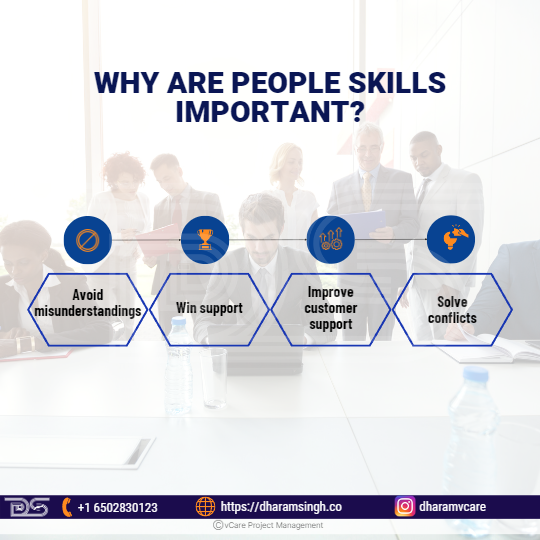
Why Are People Skills Important?
- Avoid misunderstandings: People are less likely to misinterpret what you’re saying if you communicate ideas and instructions.
- Win support: If you can communicate effectively and understand what your team wants to hear, it will be much simpler to persuade them and get them “on board.”
- Improve customer support: You’ll be better positioned to fix their difficulties if you can get inside their minds and comprehend their key problems.
- Solve conflicts: Conflict isn’t always unpleasant, but if it goes unresolved, it can harm morale and productivity. Strong people skills allow us to see things from a new perspective and identify similarities, which reduces the likelihood of significant conflicts.
How to develop people skills?
Even while people skills are critical, they are frequently undervalued by employers when it comes to job advancement. Internal training sessions are frequently centered on teaching hard skills, such as completing a given activity or utilizing a specific piece of software. These methods make it more difficult for professionals to build their interpersonal skills.
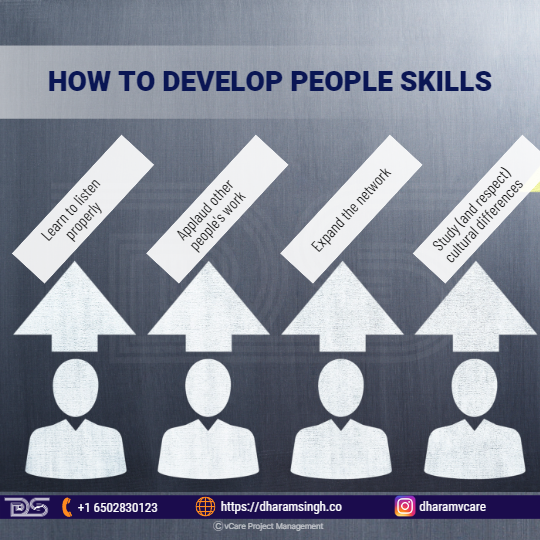
How To Develop People Skills?
But just because something is more difficult does not make it impossible. Here are four suggestions for improving people skills and becoming a more attractive prospect are:
- Learn to listen properly
- Applaud other people’s work
- Expand the network
- Study (and respect) cultural differences
Final Thoughts
Effective project management is challenging but having people skills may help project leaders run projects more efficiently and with less stress. Furthermore, it enables building a team that can handle the most challenging tasks and is more successful and resilient during difficult times.
People skills, on their own, will not keep a project team motivated and engaged. However, arming oneself with the necessary technical skills and intelligent tools may dramatically enhance the workflow and contribute to the project’s success.
Feel free to check out my discussion on this topic with Thomas Walenta in YouTube
For any questions related to your Project Management career, training, and certifications, you can book an obligation free 15 minutes session with me by visiting http://talktodharam.com/
You can subscribe to the vCare Project Management YouTube Channel to catch future videos of our Q&A series and certification success stories: https://bit.ly/2YF0wJl
You can subscribe to and follow my podcasts and interviews with Project Management Experts on YouTube at https://bit.ly/2NDY8wd


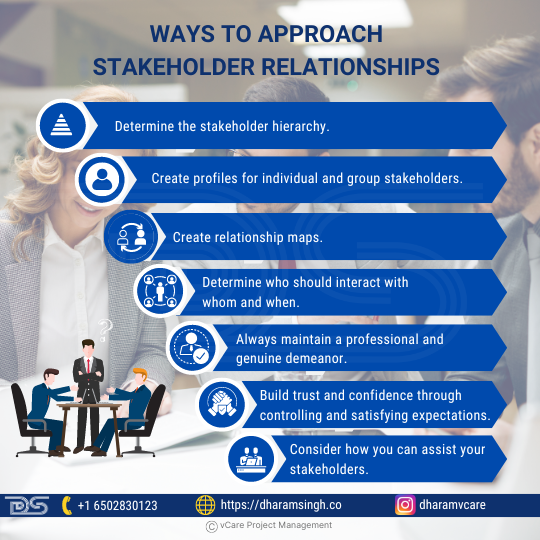





























Recent Comments